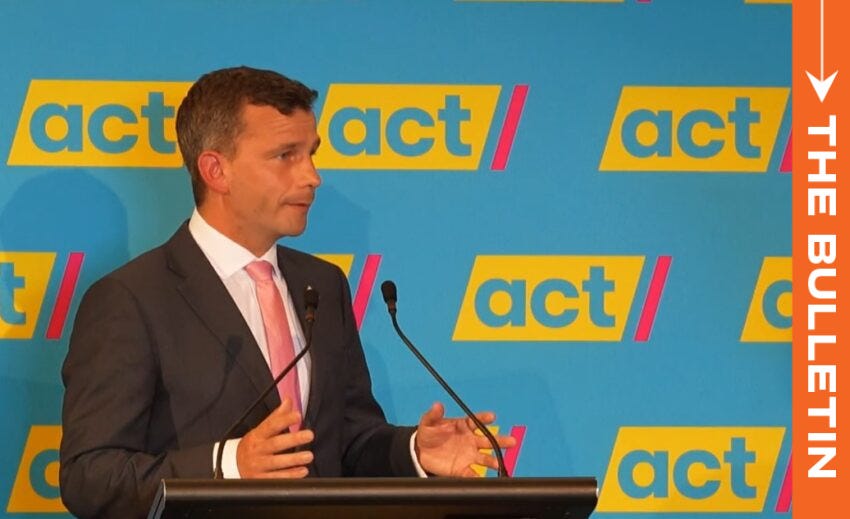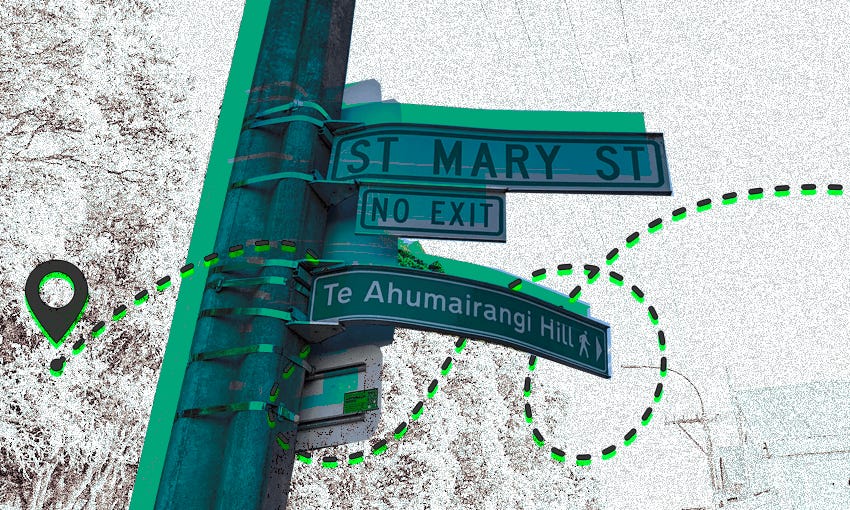David Seymour says he won't back down on Treaty bill
The Act leader argues that Māori leaders who criticise his Treaty Principles Bill should be wary of ‘inciting baseless racial resentment’.
Mōrena, and welcome to The Bulletin for Monday, January 29, written by Catherine McGregor.
In today’s edition: Council ‘marking its own homework’ on flood review report; Airbnb pleads for delay to April 1 ‘app tax’; Risk to Wellington emergency services from plastic stick barriers a known issue for nearly two years; But first, 20 years after Orewa, another controversial State of the Nation speech on Treaty issues.
Act leader David Seymour speaks at a campaign event in 2020. (Photo: Greg Bowker/Getty Images)
Seymour laments ‘divisive’ response to proposed bill
If people thought the Act leader would try to strike a more conciliatory note after a week of outrage over his Treaty Principles Bill, they were very wrong. David Seymour gave his annual state of the nation speech in Auckland on Sunday, and devoted much of it to a defence of his highly controversial proposed legislation. Its critics say the bill is divisive, but Seymour said in fact it’s those who call the bill “racist” who are sowing division. Māori leaders with “the ear of the young” should ask themselves if they’re dealing with the issues responsibly, “or simply inciting baseless racial resentment”. Viewing the Treaty as a partnership had ingrained the idea that tangata whenua and tangata tiriti "each have different political and legal rights", he said. "This is not only untrue, it is incompatible with the fundamental democratic value that all citizens are equal under the law.”
Density rules on the chopping block
Another section of the speech that raised eyebrows, at least among the yimby set, was Seymour’s criticism of the Clark, Key and Ardern governments for allegedly claiming “there was no housing crisis when ownership rates were in free fall and houses cost 10 times income”. That’s rich, say housing advocates, given Act’s eagerness to delete mandatory Medium Density Residential Standards (MDRS) from the statute books. On Saturday, Newshub reported that a new law to that effect is “being written”. While the government has a number of policies to promote new housing, making MDRS optional for councils – which many councils have been advocating for – risks slowing down the homebuilding rate while pushing new developments onto greenfield sites. It’ll also mean more resource consent requirements – ie, red tape. It’s all about Act “continuing to argue for more regulation and fewer property rights for people when it comes to housing,” says Greater Auckland’s Matt Lowrie, tongue presumably firmly in cheek.
‘The sweet spot between not racist enough, and too racist’
Back to the Treaty Principles Bill, and what it means for the government. In the Sunday Star-Times (paywalled), Andrea Vance sardonically congratulates Act for nailing “that sweet spot between not racist enough, and too racist” with their approach to a bill they know is certain not to pass. The real question, she says, is how PM Chris Luxon got himself into this situation in the first place. “National loses every way out of this exercise, a conclusion anyone who spent more than 10 minutes thinking about this issue would have drawn.” In the Herald (paywalled), Thomas Coughlan considers how Labour stays relevant while Treaty issues dominate the political debate. “Labour cannot and should not back down from its position at the political vanguard when it comes to championing Māori,” Coughlan writes. “However, the advent of a left-wing Māori Party, with a large presence in Parliament does present a challenge that Labour hasn’t faced in some time, if ever.”
The controversial history of state of the nation speeches
The Act leader’s state of the nation speech is a longstanding tradition. While such speeches had already been delivered by other party leaders, the first from an Act leader that I can find was the one by Richard Prebble in February 2004. He was speaking just a fortnight after National leader (and later Act leader) Don Brash had given his own state of the nation address at Orewa. That famous speech was focused on what Brash termed the Treaty “grievance industry" and the unwarranted injection of Treaty Principles (them again) into legislation by Helen Clark’s Labour government. The speech led to a surge in support for National and, according to a 2018 data analysis by Stuff, may have ultimately helped steer a dramatic change in government rhetoric. “Clark's mentions of the Treaty fell from about one mention in every eight press releases and speeches in 2004 to just one in 100 in 2005.”
See Gone By Lunchtime live at Q Theatre!
Gone By Lunchtime is taking the stage to bring its unique blend of insight, humour and irreverence to a very special live episode. Join The Spinoff’s Toby Manhire, along with Annabelle Lee-Mather (Ngāi Tahu, Ngāti Kahungunu, Ngāti Māmoe) (executive producer of The Hui) and Ben Thomas (former press secretary in the Key government), as they boldly step out of the studio and in front of an audience to cast a curious and caustic eye on New Zealand politics. Don’t miss this rare opportunity to see the 2023 winner of Best Politics Podcast (NZ Podcast awards) brought to life a Q Theatre as part of PodFest at Q.
When and where
7.30pm, Thursday 15th February
Q Theatre Rangatira – 305 Queen St, Auckland CBD
Click here to get your tickets now!
Council ‘marking its own homework’ on flood review report
A former police chief who produced the review of Auckland Council’s response to last year’s devastating anniversary weekend floods has criticised Mayor Wayne Brown for failing to invite his team back to review progress. Mike Bush delivered his 107-page report in April 2023 and says that while he understands work has commenced, he cannot say with certainty that any of the reports 17 recommendations have been implemented. Without oversight, council is essentially “marking its own homework”, he tells the Herald’s Tom Dillane (paywalled). Auckland Council chief executive Phil Wilson says they’re still in the midst of carrying out an action plan that incorporates the Bush report findings, and Bush and his team will be contacted to conduct an independent review in due course.
Airbnb pleads for delay to April 1 ‘app tax’
The government has no plans to defer implementation of a requirement that Airbnb charge GST for New Zealand stays from April 1 2024. Finance minister Nicola Willis was unmoved by a letter from the company which said the deadline was “unworkable”, reports the Sunday Star-Times’ Tom Pullar-Strecker. The GST requirement, which also applies to other multinational service companies such as Uber, has been in the pipeline for almost a year but Airbnb had been comforted by National’s pre-election assurances that they would repeal the so-called “app tax”. However, the new government quickly “reversed that stance as pressure increased to find alternative measures to fund its proposed income tax cuts”, Pullar-Strecker writes. Under the new law, GST must be levied even if hosts fall under the $60,000 annual revenue threshold for mandatory GST registration.
The Spinoff is powered by its supporters
In 2023, Spinoff readers funded some of our most beloved, well-read, impactful work. Help Me Hera, The Cost of Being, powerful longreads, Election 2023 coverage, laugh-out-loud satire, Auckland stories, Wellington stories, Christchurch stories and everything in between were powered by Spinoff members and donors. If you did support us, thank you from all of us at The Spinoff. If helping fund well-crafted and insightful journalism is on your list for 2024, donate today or sign up to become a Spinoff member.
Click and Collect
The risk posed to emergency services by plastic stick barriers used in many Wellington cycle lanes was raised with Wellington Council staff as far back as 2022.
Wild weather forced last night’s Simple Minds outdoor set in Hamilton to be cut short.
Environmental protesters throw soup at the (glass-protected) Mona Lisa.
Police minister promises fed-up Point Chev residents more police on the street to address ongoing issues with public drunkeness and crime.
Feeling clever? Click here to play 1Q, Aotearoa’s newest, shortest daily quiz.
Sometimes, walking is still the fastest way to get there – especially if you know a shortcut, writes Shanti Mathias. Tommy de Silva makes the case for celebrating Auckland's anniversary not today, but on September 18. Anna Rawhiti-Connell hasn’t seen the Barbie movie but she still hates it – and it’s mostly because she’s 44. Tara Ward reviews Black Coast Vanishings, the new Three series about unsolved disappearances in Piha. Gabi Lardies wonders at the new new trend of tents on car roofs. And Tommy de Silva and Gabi Lardies look at how Auckland has changed since the Anniversary Weekend floods, a year ago on Saturday.
Sporting snippets
Italian Jannik Sinner has won the Australian Open men’s final. He’s the first Melbourne champ in a decade not named Djokovic, Nadal or Federer.
The Silver Ferns netballers finished with a bronze in the Nations Cup in Leeds.
Got some feedback about The Bulletin, or anything in the news? Get in touch with me at thebulletin@thespinoff.co.nz.
If you liked what you read today, share The Bulletin with friends, family and colleagues.












I don't give Luxon credit for much, but making Seymour the fall-guy.. I mean Minister in charge ... of this is obviously an attempt to distance the Nats from the 2nd head of the 3-headed monster when it comes to the next election cycle ? Despite SOME saying that the "majority" voted for this, NO THEY DIDN'T, as the majority of this coalition did not have it as a policy that voters knew they would be getting. The "silent majority" VOTED for parties & policies that did NOT have this as a policy (National, Labour, Greens, Te Pati Maori ...) so were in fact NOT silent!
Smeg off Rimmer